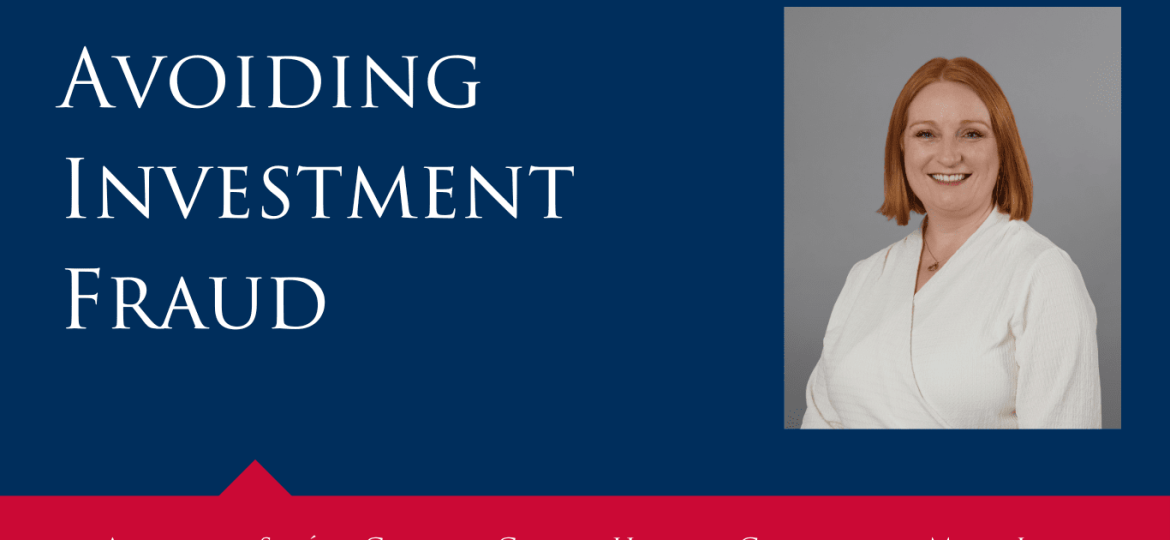
You may have read one of the many reports in the news today about Bank of Ireland’s Red C Poll regarding investment fraud, it included a number of startling facts such as how
“94% of people in Ireland have been targeted by fraudsters in the last year”
Or
“investment fraud attempts have surged 76% so far this year compared to last”
and it likely has you thinking about how to stay safe with so many bad actors out there trying to con you out of your hard-earned money.
We have all (well 94% of us anyway) received a text message, WhatsApp, phone call or email either pretending to be someone close to us
“Hi mam its me, I’m using my friends phone because mine is broken, can you transfer money to me so I can get it fixed, thanks”
or from a bank
“your account has been frozen due to suspicious activity, please click here to unlock your account”
And we all feel pretty confident that we wouldn’t fall for these scams, though they wouldn’t still exist if people weren’t regularly falling afoul of these messages, but investment frauds can be harder to detect and often use less obvious tactics. Despite any differences all frauds have one thing in common, and that is the goal to steal your money.
What does an investment fraud attempt look like?
A scammer poses as a legitimate firm offering investment opportunities; to invest in products or businesses which are often fake or do not exist. These opportunities are often advertised on social media sites or they can duplicate a legitimate firms website and social media pages to make it seem above board.
These ‘opportunities’ are presented as low to no risk, with fast profits, and there is usually a short deadline to get in on it, adding to the pressure of not wanting to lose out which can lead to impulsive decision making.
They generally start on social media, where you might click on an ad or download an information document but move to phone calls and emails afterwards.
How do I know if I am talking to a legitimate advisor?
Firstly, don’t be complacent. Despite the rise in fraud, some 43% of people still view themselves as being under little or no risk of fraud in the next six months. This increases to 52% in the 18 – 30 age category. But as I said above, if these scams didn’t work, they wouldn’t still exist. Its important to remember that scammers are professionals, and we should always assume they are one step ahead of us.
Secondly, all investment opportunities and advisors should be fully researched prior to handing over any money. Make sure to do your due diligence, all financial institutions in Ireland must be registered with the Central Bank of Ireland, you can check the register here.
Insist on meeting in person at their offices, you should never part with your money to someone you have not met. And no good financial advisor would avoid meeting with a prospective client.
Check the facts and figures, can they provide you with factsheets and key investment documents detailing the investment funds, are they transparent about charges and fees. This is all information that financial advisory firms are required by law to provide to you.
The garda website has great information about frauds and their top tips to avoid falling for investment frauds are succinct:
• Never send money to a third party unless you can trust their bona fides.
• Be wary of unsolicited contacts or where the contact appears to be based in other jurisdictions.
• Be wary when the avenues for contacting the other party are limited.
• Push for direct answers and if responses are vague disengage immediately.
• Never give personal, financial or security information to persons who are unknown to you.
• If it sounds too good to be true it probably is.
• Do your research and accept nothing as fact until you have satisfied yourself that it is genuine.
Any reputable financial services provider will be delighted to talk about the safeguards they have in place and won’t be concerned about any questions you have, nor will they push you or rush you. I have written blogs about how safe your money is with Metis Ireland, my most recent blog can be read here.
Get rich quick schemes always sound great, that’s why so many of us play the lotto. But the best way to ensure your financial freedom and to get your best return on life is to sit down with a financial planner, who will listen to what you want yours and your families future to look like and will help you put a plan in place to get you there.
For personalised advice, please do get in touch on 01 908 1500 or email us at info@metisireland.ie.
Sinéad Clinton Caldas MSc, FCI Compliance, BA, LCI, QFA, CFCP, CDPO
Head of Compliance
Head of Anti-Money Laundering and Counter Terrorist Financing Legislation Compliance
Sinéad holds a Masters in Compliance, is an FCI Compliance and LCI with the Compliance Institute of Ireland and is a Qualified Financial Advisor (QFA), a Certified Financial Crime Professional (CFCP), and a Certified Data Protection Officer (CDPO).
The statistics used in this blog came from a Bank of Ireland and Red C Poll as discussed here
Disclaimer
Metis Ireland Financial Planning Ltd t/a Metis Ireland is regulated by the Central Bank of Ireland.
All content provided in these blog posts is intended for information purposes only and should not be interpreted as financial advice. You should always engage the services of a fully qualified financial adviser before entering any financial contract. Metis Ireland Financial Planning Ltd t/a Metis Ireland will not be held responsible for any actions taken as a result of reading these blog posts.


